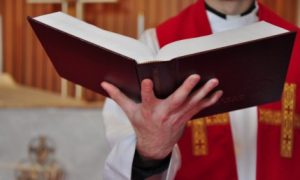What is repentance?
Dear reader,
If you’ve seen this question on the sign outside the church and come to our website to find the answer, your wisdom has rewarded you. Often, when Jesus preached, especially with parables, the crowds would listen to Jesus speak but most would never think very deeply or try to really understand what he was teaching. To his disciples who asked about the meaning of his parables Jesus stated, “To you it has been given to know the secrets of the kingdom of God, but for others they are in parables, so that ‘seeing they may not see, and hearing they may not understand.'” (Luke 8:10, English Standard Version) Because they truly wanted to learn what Jesus was teaching, Jesus revealed God’s truth to his disciples.
Now back to the question on the church sign, “What is repentance?” Repentance is being contrite (sorry) for your sin, telling God in prayer or in worship you are sorry, and then seeking to amend your life.
Repentance begins with sorrow for sin. In today’s world, most people make endless excuses for their sin and blame others or their conditions and say that their sins are not their fault. Repentance involves “owning” your sins, that is, taking personal responsibility for them. With that personal responsibility comes sorrow or regret for your sins. This is good and healthy because if you are not sorry for your sins you will certainly not ask God for forgiveness for them or live any differently.
The next part of repentance is facing God and telling him you are sorry: this is done privately in prayer, in corporate confession in the liturgy of the church, or in private confession and absolution. This is hard to do. While we desire intimacy with God we also rightly and instinctively realize that God is all holy and we are not and so we rightly fear going into God’s presence in prayer or worship because we all know God is holy and we are not. But this is what God desires, that we own our sins and then come before him in prayer and confession and ask him for forgiveness for our sins.
The last part of repentance is seeking to turn away from sin and lead a new life. We don’t have power to do this on our own. This power comes from God, and the power comes from being forgiven of our sins by God.
Repentance is only one part of Ash Wednesday and Lent; the most important part, arguably, is being forgiven for your sins-the sins you’ve just confessed to God.
Lent is all about following Jesus to a cross, outside Jerusalem, where he dies for the sin of the world, my sin and your sin included. Jesus was sinless and so he died for our sin. He could do this because He is God from eternity, who took on humanity in time, being conceived in the womb of his mother, the Virgin Mary, and born to be our Saviour. The end of Lent, Holy Week, where Jesus is crucified on Good Friday is the place where our sins end. Jesus promised all who trust in him as their Lord and Saviour are forgiven by his death for their sin. This leads us back to the forgiveness part of repentance.
The whole point of repentance is to confess your sins to Jesus and then receive forgiveness for them from him. And so what is repentance? It is being contrite for your sin, telling God in prayer you are sorry, seeking to amend your life, and most importantly going to the next step which is trusting in Jesus for the forgiveness of your sins.
Holy Week does not end in Good Friday, it ends with Easter, Jesus resurrection from the dead. And so Lent is a journey with Jesus to the cross where he pays the price for our sin. Our sins are not forgiven because of anything we do: like showing perfect repentance in every way-if that were true, no one could be forgiven. Our sins are forgiven because God in Jesus dealt with them by Jesus’ death for them and Jesus’ resurrection from the dead on Easter Sunday. Jesus’ resurrection has opened the way for a bodily resurrection from the dead for all who believe He is their Lord and Saviour from sin and death.
May God bless you with repentance, faith and joy in Jesus this Lent and always.
Sincerely,
Pastor Korsch

